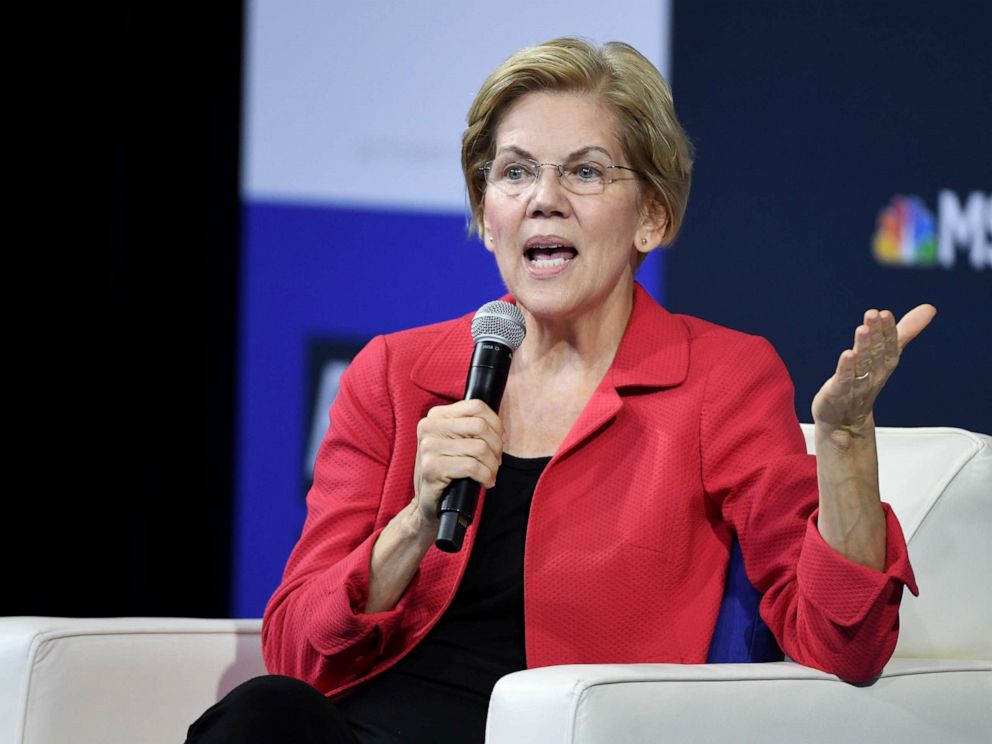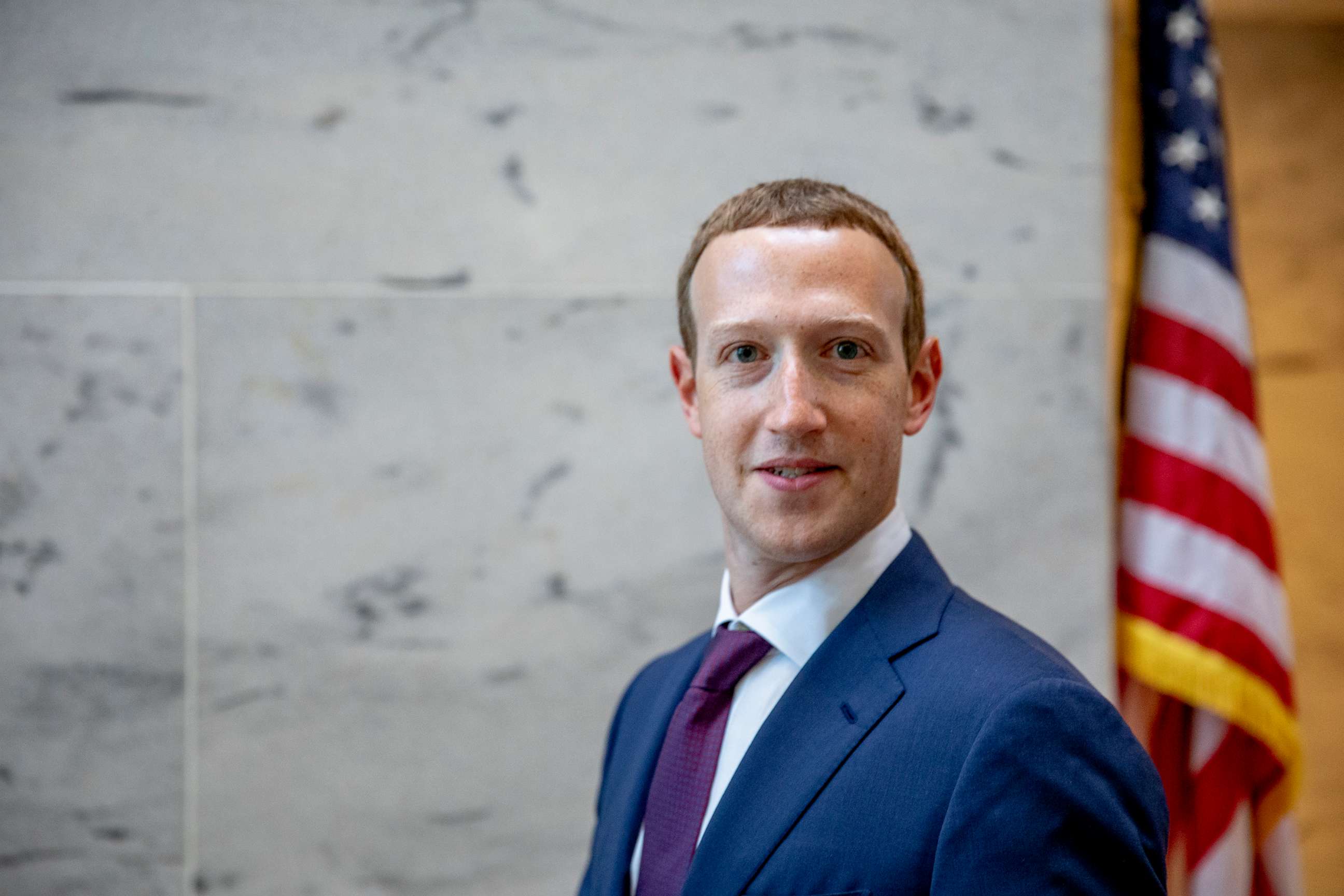2020 candidate Sen. Elizabeth Warren uses false ads to lash out at Facebook CEO
The advertisements claimed Facebook endorsed Donald Trump for re-election.
Massachusetts senator and presidential candidate Elizabeth Warren continued her campaign against Facebook on Sunday, one day after she posted false advertisements to Facebook on Saturday to see if she could prove to voters that the social media platform values profit over facts.
"Facebook holds incredible power to affect elections and our national debate. They’ve decided to let political figures lie to you -- even about Facebook itself -- while their executives and their investors get even richer off the ads containing these lies," Warren wrote in a series of Twitter posts Saturday criticizing Facebook and its founder, Mark Zuckerberg.
The ads, publicly sponsored by the Warren campaign, claim Zuckerberg endorsed President Donald Trump for reelection, showing a photo of Trump and Zuckerberg in the Oval Office. Then the ads immediately take it back, ironically slamming Zuckerberg for giving politicians free reign to post false information.
"You're probably shocked, and you might be thinking, 'How could this possibly be true?' Well, it's not," the ads say. "But what Zuckerberg has done is given Donald Trump free reign to lie on his platform -- and then to pay Facebook gobs of money to push out their lies to American voters."
On Sunday, Warren levied criticism at Facebook over a reported settlement over a lawsuit related to inflated video metrics.
"Companies shifted their resources and strategies because of Facebook's inflated metrics, costing them money and contributing to job losses," Warren tweeted. "We need to do a lot more to hold Facebook accountable."
Criticism of the platform's ad policy broke out last week as Facebook political ad transparency reports showed Trump's reelection team dropped a total of $1.1 million on political ads between Sept. 22-28, pushing against an impeachment inquiry by House Democrats.

Warren said her campaign intentionally made the ad to see if Facebook would approve it, and they quickly did. She said many of the ads Facebook approves are ones TV stations won't even air.
"Once again, we’re seeing Facebook throw its hands up to battling misinformation in the political discourse, because when profit comes up against protecting democracy, Facebook chooses profit," Warren wrote.
She added, "Facebook just takes the cash, no questions asked."
Facebook tweeted about the ad via its newsroom account on Saturday in an effort to explain why it decided against pulling the fake ad.
"@ewarren looks like broadcast stations across the country have aired this ad nearly 1,000 times, as required by law," Facebook tweeted. "FCC doesn’t want broadcast companies censoring candidates’ speech. We agree it’s better to let voters—not companies—decide. #FCC #candidateuse"
The social media giant's response only seemed to intensify Warren's furry as she immediately responded in a tweeted that accused the company of changing its ad policies to boost what she called it's "the disinformation-for-profit business."
"You’re making my point here. It’s up to you whether you take money to promote lies," she wrote Saturday evening in a tweet that quoted the company's earlier statement. "You can be in the disinformation-for-profit business, or you can hold yourself to some standards. In fact, those standards were in your policy. Why the change?"
Facebook did not immediately respond to ABC News' e-mail request on Sunday asking for a response to Warren's claims about it changing its advertising policies.
Warren's campaign declined to detail how much they spent on this particular ad or how long they're planning on letting it run, but according to Advertising Analytics, a firm that tracks campaign spending, the price tag most likely fell somewhere in between $4,000 and $5,000.
In the last week, Warren's election team has spent a little more than $172,000 on Facebook advertising, bringing her total ad spending on the platform to about $4.1 million. According to analytics from Facebook's ad library, the fake ads have overwhelmingly and disproportionately reached women over men across all age demographics. They also weren't being shown in any or the four primary states as it's focus has been primarily targeted to states like California New York, Florida and Texas, according to ABC News' analysis of the public data.
This isn't the first rift between the lawmaker and Facebook.

In March, Warren unveiled her plans to break up "big tech" companies. Through the policy, Warren would "unwind tech mergers that illegally undermine competition " -- citing Amazon for its takeover of Whole Foods, Facebook for its takeover of WhatsApp and Instagram and Google's for its takeover of the mapping app Waze.
“Today’s big tech companies have too much power -- too much power over our economy, our society, and our democracy,” Warren said in a statement. “They’ve bulldozed competition, used our private information for profit, and tilted the playing field against everyone else.”
Zuckerberg said he would "go to the mat" and fight for his company against Warren's policy, according to audio leaked Oct. 1 from a July Q&A session with Facebook employees at company headquarters.
"Does that still suck for us? Yeah. I mean, I don’t want to have a major lawsuit against our own government ... We care about our country and want to work with our government and do good things," Zuckerberg said in the audio. "But look, at the end of the day, if someone’s going to try to threaten something that existential, you go to the mat and you fight."
Warren expressed concerns on Twitter that she believes Facebook holds power not just over the social media market, but also the political conversation surrounding the 2020 election. And as the fourth Democratic debate nears and early-voting states are paying closer attention to the candidates, she said letting false claims circulate is dangerous.
"Facebook already helped elect Donald Trump once through negligence," she tweeted. "Now, they've changed their policy so they can profit from lies to the American people."
A sign-up sheet was created on her campaign website to give voters what she called a chance to "hold Mark Zuckerberg accountable."




